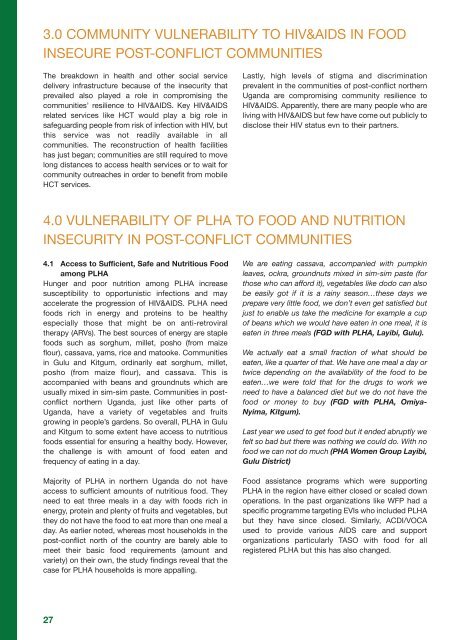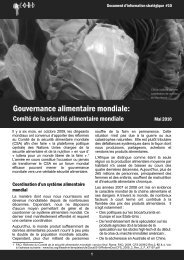Uganda Report 2012 FINAL PO:Layout 1 - ACORD
Uganda Report 2012 FINAL PO:Layout 1 - ACORD
Uganda Report 2012 FINAL PO:Layout 1 - ACORD
Create successful ePaper yourself
Turn your PDF publications into a flip-book with our unique Google optimized e-Paper software.
3.0 COMMUNITY VULNERABILITY TO HIV&AIDS IN FOOD<br />
INSECURE <strong>PO</strong>ST-CONFLICT COMMUNITIES<br />
The breakdown in health and other social service<br />
delivery infrastructure because of the insecurity that<br />
prevailed also played a role in compromising the<br />
communities’ resilience to HIV&AIDS. Key HIV&AIDS<br />
related services like HCT would play a big role in<br />
safeguarding people from risk of infection with HIV, but<br />
this service was not readily available in all<br />
communities. The reconstruction of health facilities<br />
has just began; communities are still required to move<br />
long distances to access health services or to wait for<br />
community outreaches in order to benefit from mobile<br />
HCT services.<br />
Lastly, high levels of stigma and discrimination<br />
prevalent in the communities of post-conflict northern<br />
<strong>Uganda</strong> are compromising community resilience to<br />
HIV&AIDS. Apparently, there are many people who are<br />
living with HIV&AIDS but few have come out publicly to<br />
disclose their HIV status evn to their partners.<br />
4.0 VULNERABILITY OF PLHA TO FOOD AND NUTRITION<br />
INSECURITY IN <strong>PO</strong>ST-CONFLICT COMMUNITIES<br />
4.1 Access to Sufficient, Safe and Nutritious Food<br />
among PLHA<br />
Hunger and poor nutrition among PLHA increase<br />
susceptibility to opportunistic infections and may<br />
accelerate the progression of HIV&AIDS. PLHA need<br />
foods rich in energy and proteins to be healthy<br />
especially those that might be on anti-retroviral<br />
therapy (ARVs). The best sources of energy are staple<br />
foods such as sorghum, millet, posho (from maize<br />
flour), cassava, yams, rice and matooke. Communities<br />
in Gulu and Kitgum, ordinarily eat sorghum, millet,<br />
posho (from maize flour), and cassava. This is<br />
accompanied with beans and groundnuts which are<br />
usually mixed in sim-sim paste. Communities in postconflict<br />
northern <strong>Uganda</strong>, just like other parts of<br />
<strong>Uganda</strong>, have a variety of vegetables and fruits<br />
growing in people’s gardens. So overall, PLHA in Gulu<br />
and Kitgum to some extent have access to nutritious<br />
foods essential for ensuring a healthy body. However,<br />
the challenge is with amount of food eaten and<br />
frequency of eating in a day.<br />
Majority of PLHA in northern <strong>Uganda</strong> do not have<br />
access to sufficient amounts of nutritious food. They<br />
need to eat three meals in a day with foods rich in<br />
energy, protein and plenty of fruits and vegetables, but<br />
they do not have the food to eat more than one meal a<br />
day. As earlier noted, whereas most households in the<br />
post-conflict north of the country are barely able to<br />
meet their basic food requirements (amount and<br />
variety) on their own, the study findings reveal that the<br />
case for PLHA households is more appalling.<br />
We are eating cassava, accompanied with pumpkin<br />
leaves, ockra, groundnuts mixed in sim-sim paste (for<br />
those who can afford it), vegetables like dodo can also<br />
be easily got if it is a rainy season…these days we<br />
prepare very little food, we don’t even get satisfied but<br />
just to enable us take the medicine for example a cup<br />
of beans which we would have eaten in one meal, it is<br />
eaten in three meals (FGD with PLHA, Layibi, Gulu).<br />
We actually eat a small fraction of what should be<br />
eaten, like a quarter of that. We have one meal a day or<br />
twice depending on the availability of the food to be<br />
eaten…we were told that for the drugs to work we<br />
need to have a balanced diet but we do not have the<br />
food or money to buy (FGD with PLHA, Omiya-<br />
Nyima, Kitgum).<br />
Last year we used to get food but it ended abruptly we<br />
felt so bad but there was nothing we could do. With no<br />
food we can not do much (PHA Women Group Layibi,<br />
Gulu District)<br />
Food assistance programs which were supporting<br />
PLHA in the region have either closed or scaled down<br />
operations. In the past organizations like WFP had a<br />
specific programme targeting EVIs who included PLHA<br />
but they have since closed. Similarly, ACDI/VOCA<br />
used to provide various AIDS care and support<br />
organizations particularly TASO with food for all<br />
registered PLHA but this has also changed.<br />
27





